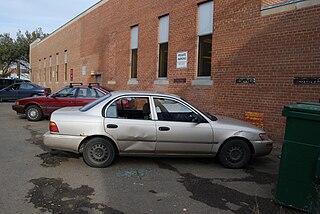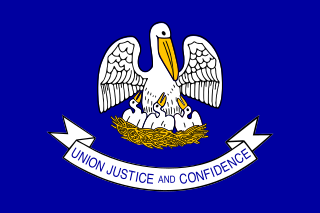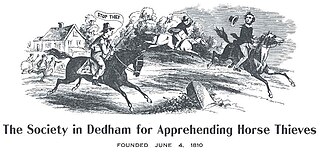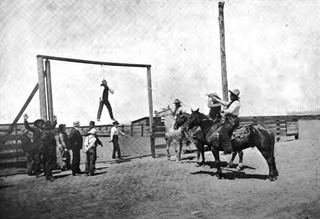
Waveland is a city located in Hancock County, Mississippi, United States, on the Gulf of Mexico. It is part of the Gulfport–Biloxi, Mississippi Metropolitan Statistical Area. The city of Waveland was incorporated in 1972. As of the 2010 census, the city had a population of 6,435. Waveland was nearly destroyed by Hurricane Camille on August 17, 1969, and by Hurricane Katrina on August 29, 2005.

Shergar was an Irish-bred, British-trained Thoroughbred racehorse. After a very successful season in 1981 he was retired to the Ballymany Stud in County Kildare, Ireland. In 1983 he was stolen from the stud, and a ransom of £2 million was demanded; it was not paid, and negotiations were soon broken off by the thieves. In 1999 a supergrass, formerly in the Provisional Irish Republican Army (IRA), stated they stole the horse. The IRA has never admitted any role in the theft.

Motor vehicle theft or car theft is the criminal act of stealing or attempting to steal a motor vehicle.

Art theft, sometimes called artnapping, is the stealing of paintings, sculptures, or other forms of visual art from galleries, museums or other public and private locations. Stolen art is often resold or used by criminals as collateral to secure loans. Only a small percentage of stolen art is recovered—an estimated 10%. Many nations operate police squads to investigate art theft and illegal trade in stolen art and antiquities.

A microchip implant is an identifying integrated circuit placed under the skin of an animal. The chip, about the size of a large grain of rice, uses passive radio-frequency identification (RFID) technology, and is also known as a PIT tag. Standard pet microchips are typically 11–13 mm long and 2 mm in diameter.

Hurricane Katrina was a devastating and deadly tropical cyclone that caused 1,392 fatalities and damages estimated at $186.3 billion in late August 2005, particularly in the city of New Orleans and its surrounding area. Katrina was the twelfth tropical cyclone, the fifth hurricane, and the third major hurricane of the 2005 Atlantic hurricane season. It was also the fourth-most intense Atlantic hurricane to make landfall in the contiguous United States, gauged by barometric pressure.
Noah's Wish was a charity that rescues and takes care of animals endangered by natural disasters.

Criticism of the government response to Hurricane Katrina was a major political dispute in the United States in 2005 that consisted primarily of condemnations of mismanagement and lack of preparation in the relief effort in response to Hurricane Katrina and its aftermath. Specifically, there was a delayed response to the flooding of New Orleans, Louisiana.

The disaster recovery response to Hurricane Katrina in late 2005 included U.S. federal government agencies such as the Federal Emergency Management Agency (FEMA), the United States Coast Guard (USCG), state and local-level agencies, federal and National Guard soldiers, non-governmental organizations, charities, and private individuals. Tens of thousands of volunteers and troops responded or were deployed to the disaster; most in the affected area but also throughout the U.S. at shelters set up in at least 19 states.
Hurricane Katrina had many social effects, due the significant loss and disruption of lives it caused. The number of fatalities, direct and indirect, related to Katrina is 1,833 and over 400,000 people were left homeless. The hurricane left hundreds of thousands of people without access to their homes or jobs, it separated people from relatives, and caused both physical and mental distress on those who suffered through the storm and its aftermath, such as Post-traumatic stress disorder (PTSD).

The Society in Dedham for Apprehending Horse Thieves is one of the "oldest continually existing horse thief apprehending organization in the United States, and one of Dedham's most venerable social organizations." Since its founding there have been more than 10,000 members including heads of state, Supreme Court justices, governors, popes, professors, generals, and other notables.
Dog theft is the crime of taking a dog from its owner. The theft of a dog to be held for ransom may be called dognapping, by analogy with kidnapping.
Katrina Aid Today is a relief charity in the United States, that works to provide long term recovery support to survivors of Hurricane Katrina. United Methodist Committee on Relief (UMCOR), the humanitarian relief and development agency of the United Methodist Church, manages the U.S. Department of Homeland Security's Federal Emergency Management Agency (FEMA) sponsored program. Nine national partners and sixteen local organizations, who specialize in availability of benefits, resources and services, aim to deliver assistance to 300,000 of the most vulnerable survivors in the United States.

Equine-assisted therapy (EAT) encompasses a range of treatments that involve activities with horses and other equines to promote human physical and mental health. Modern use of horses for mental health treatment dates to the 1990s. Systematic review of studies of EAT as applied to physical health date only to about 2007, and a lack of common terminology and standardization has caused problems with meta-analysis. Due to a lack of high-quality studies assessing the efficacy of equine-assisted therapies for mental health treatment, concerns have been raised that these therapies should not replace or divert resources from other evidence-based mental health therapies. The existing body of evidence does not justify the promotion and use of equine-related treatments for mental disorders.

Horse theft is the crime of stealing horses. A person engaged in stealing horses is known as a horse thief. Historically, punishments were often severe for horse theft, with several cultures pronouncing the sentence of death upon actual or presumed thieves. Several societies were formed in the United States to prevent horse theft and apprehend horse thieves. However, horse theft continues to occur throughout the world, as horses are stolen for their meat, for ransom, or in disputes between their owners and other persons. Horse theft today is comparable to automobile theft, a crime punishable by felony jail time.
The Pets Evacuation and Transportation Standards Act (PETS) was a bi-partisan initiative in the United States House of Representatives to require states seeking Federal Emergency Management Agency (FEMA) assistance to accommodate pets and service animals in their plans for evacuating residents facing disasters. Introduced by Congressmen Tom Lantos (D-California) and Christopher Shays (R-Connecticut) on September 22, 2005, the bill passed the House of Representatives on May 22, 2006, by a margin of 349 to 29. Technically an amendment to the Stafford Act, it was signed into law by President George W. Bush on October 6, 2006. The bill is now Public Law 109-308.
W.F. Young, Inc. is a privately held American corporation that has sold animal care products since 1892. These brands and products are sold online, in farm, feed, and tack shops, and pet retailers.

Comic Relief USA was a non-profit charity organization whose mission is to raise funds to help those in need—particularly America's homeless. It has raised and distributed nearly US$50 million toward providing assistance—including health care services—to homeless people throughout the United States. Although Comic Relief's charity work is continuous, its fundraising events were held and televised at irregular intervals—and primarily by Home Box Office (HBO), with comedians Robin Williams, Billy Crystal, and Whoopi Goldberg as the hosts each time. They—along with many other comedians, celebrities, and occasional politicians—perform various segments—both general-purpose and specific to homelessness—of standup comedy, sketch comedy, speeches, live music, and impressions of persons and characters—all in order to entertain and enlighten. There are also documentary segments dealing with real-life problems of homeless people, in order to raise awareness of not only the grim realities but also how many hard-working "ordinary" people can wind up or grow up homeless. In exchange for contributions exceeding certain key amounts, T-shirts, sweatshirts and other merchandise are typically for sale. Its slogans are “Where there’s laughter, there’s hope” and “Comic Relief—it’s no joke.”

Until 2019, GadgetTrak was a company based in Portland, Oregon, that developed theft recovery and data protection software. The company was founded in February 2007 by Ken Westin with the launch of the first theft recovery product for USB mass storage devices, tracking stolen devices including iPods, flash drives, digital cameras and other devices when connected to a computer. The company was issued a patent for the technology on February 24, 2009. GadgetTrak's technology was featured during a special segment by Dateline on iPod theft where they tracked stolen iPods and confronted the thieves. A customized version of the technology was embedded in FLIR thermal imaging cameras as part of an exclusive licensing agreement under the name ThermaTrak utilized for both theft recovery as well as export controls.
The Red Hook Society for the Apprehension and Detention of Horse Thieves is the oldest horse thief apprehension society in the United States.











